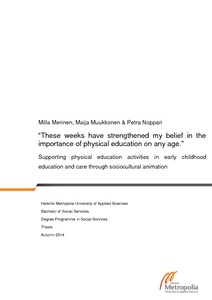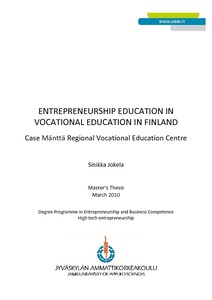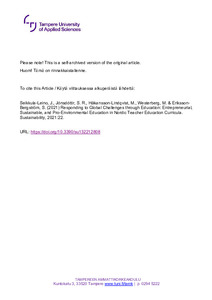Innovate to educate : How EdTech could revolutionize learning in Germany
Möhring, Markus (2025)
Möhring, Markus
2025
Julkaisun pysyvä osoite on
https://urn.fi/URN:NBN:fi:amk-2025052817191
https://urn.fi/URN:NBN:fi:amk-2025052817191
Tiivistelmä
The thesis examined how Educational Technology (EdTech) contributes to modernizing learning environments, especially targeting the German education system. The research aimed to explore the potential of EdTech innovations to improve pedagogical results, aligning education with changing economic and technological needs.
The research was guided by four research questions: How can EdTech be leveraged to unlock the full potential of education in Germany, why it is important to bring innovation into learning environments, what the possible problems of EdTech are, and what the future outlook for EdTech is. The study began with a theoretical section, addressing various aspects of EdTech, including its significance in modern education, the global EdTech market, and emerging trends such as gamification and AI. Subsequently, the study focused on the German education system, exploring aspects like decentralization, the structure of the education system, its strengths and weaknesses, and a potential future plan for effectively integrating EdTech. The research intends to help policymakers, educational institutions, and educators decide and plan to use EdTech.
A qualitative approach emphasized the theoretical part, integrating written surveys with policymakers and semi-structured interviews with educators. The empirical research aimed to encompass multiple stakeholders of the German education system to gain insights from various perspectives. Moreover, the interviews were semi-structured to allow deeper insights into unplanned, yet critical topics raised by the interviewee.
The study's key findings indicated that innovative EdTech solutions like AI-driven personalization and gamified learning platforms greatly enhance engagement and inclusivity. However, challenges such as slow digitalization, difficult bureaucracy, and educators' resistance were slowing down Germany. The research concluded that Germany’s success in integrating EdTech in the future relies on the federal states’ educational approaches and strategies, offering improved educator training to enhance teaching, and establishing ethical guidelines for AI and data privacy. The thesis emphasized the need to balance technological advancement with pedagogical integrity to ensure steady and sustainable progress in education.
The research was guided by four research questions: How can EdTech be leveraged to unlock the full potential of education in Germany, why it is important to bring innovation into learning environments, what the possible problems of EdTech are, and what the future outlook for EdTech is. The study began with a theoretical section, addressing various aspects of EdTech, including its significance in modern education, the global EdTech market, and emerging trends such as gamification and AI. Subsequently, the study focused on the German education system, exploring aspects like decentralization, the structure of the education system, its strengths and weaknesses, and a potential future plan for effectively integrating EdTech. The research intends to help policymakers, educational institutions, and educators decide and plan to use EdTech.
A qualitative approach emphasized the theoretical part, integrating written surveys with policymakers and semi-structured interviews with educators. The empirical research aimed to encompass multiple stakeholders of the German education system to gain insights from various perspectives. Moreover, the interviews were semi-structured to allow deeper insights into unplanned, yet critical topics raised by the interviewee.
The study's key findings indicated that innovative EdTech solutions like AI-driven personalization and gamified learning platforms greatly enhance engagement and inclusivity. However, challenges such as slow digitalization, difficult bureaucracy, and educators' resistance were slowing down Germany. The research concluded that Germany’s success in integrating EdTech in the future relies on the federal states’ educational approaches and strategies, offering improved educator training to enhance teaching, and establishing ethical guidelines for AI and data privacy. The thesis emphasized the need to balance technological advancement with pedagogical integrity to ensure steady and sustainable progress in education.
Kokoelmat
Samankaltainen aineisto
Näytetään aineisto, joilla on samankaltaisia nimekkeitä, tekijöitä tai asiasanoja.
-
“These weeks have strengthened my belief in the importance of physical education on any age.” : Supporting physical education activities in early childhood education and care through sociocultural animation
Noppari, Petra; Merinen, Milla; Muukkonen, Maija (Metropolia Ammattikorkeakoulu, 2014)The purpose of this functional final thesis was to outline the importance of physical education in an early childhood education and care environment. Our thesis was conducted in collaboration with the Finnish-American ... -
Entrepreneurship education in vocational education in Finland : Case Mänttä Regional Vocational Education Centre
Jokela, Sinikka (Jyväskylän ammattikorkeakoulu, 2010)The purpose of this thesis is to observe the stage of entrepreneurship education in vocational education in Finland. The research problem is how entrepreneurship education is realized in vocational schools compared to the ... -
Responding to Global Challenges through Education : Entrepreneurial, Sustainable, and Pro-Environmental Education in Nordic Teacher Education Curricula
Seikkula-Leino, Jaana; Jónsdóttir, Svanborg R.; Håkansson-Lindqvist, Marcia; Westerberg, Mats; Eriksson-Bergström, Sofia (MDPI, 2021)



